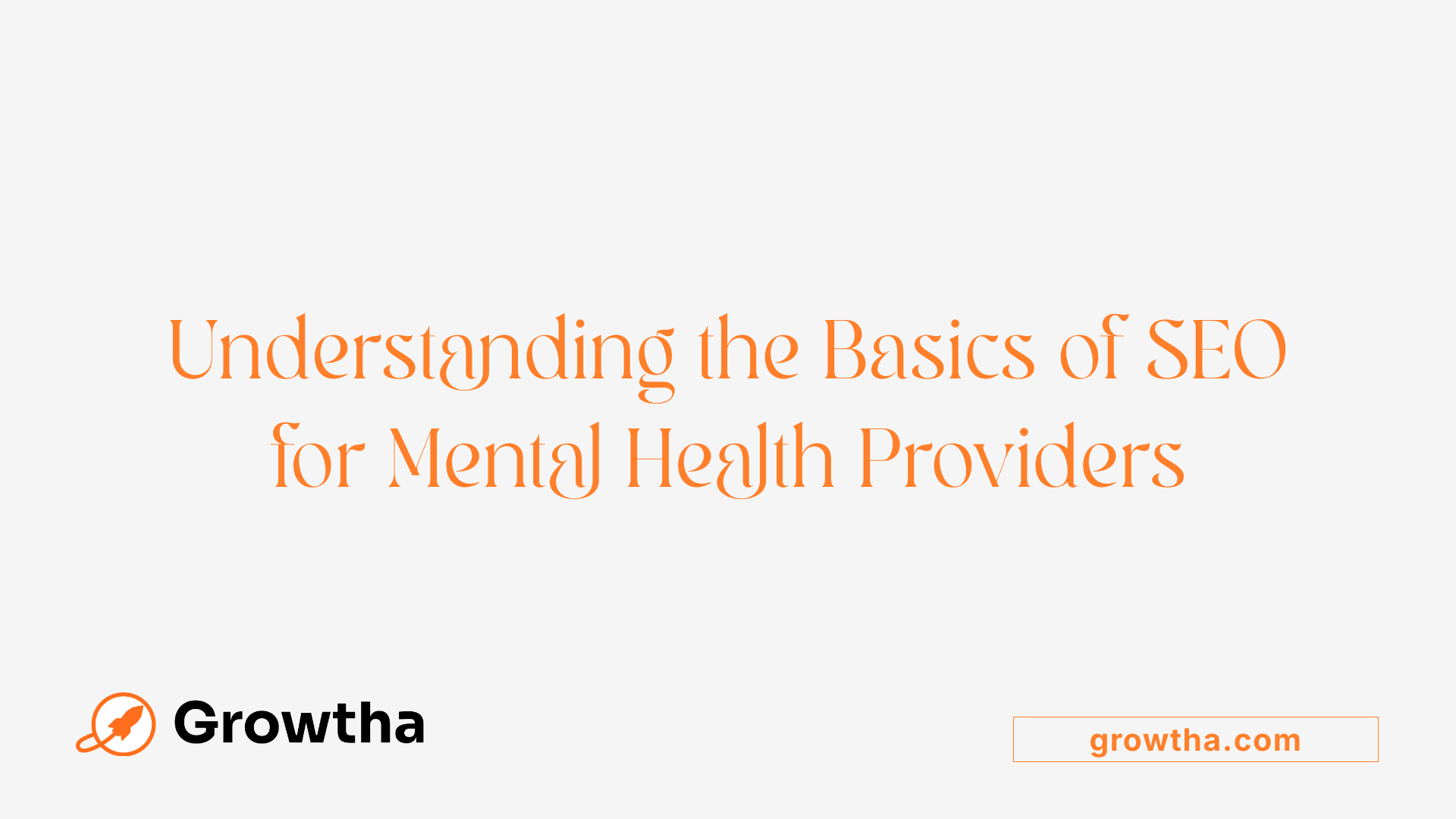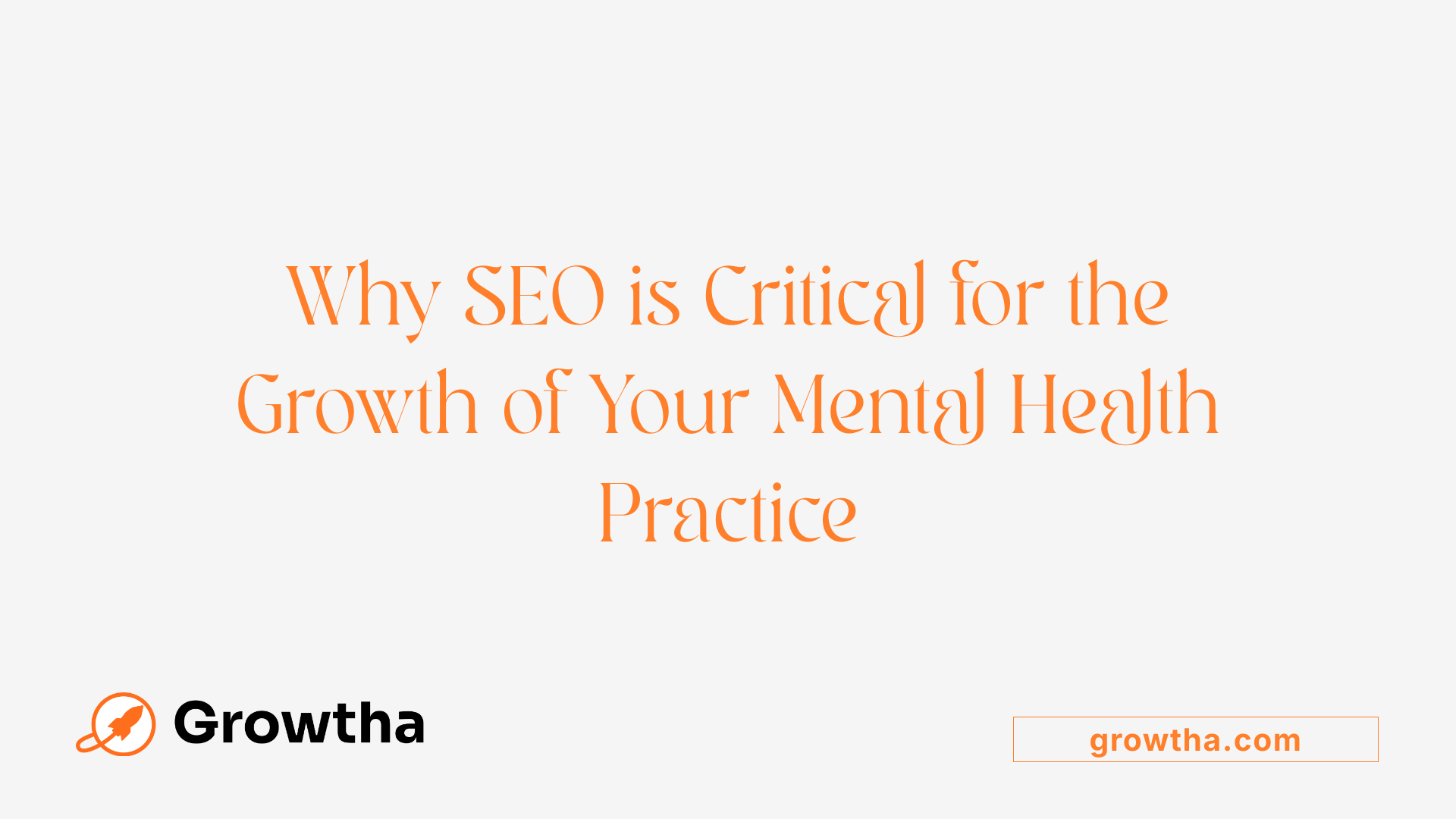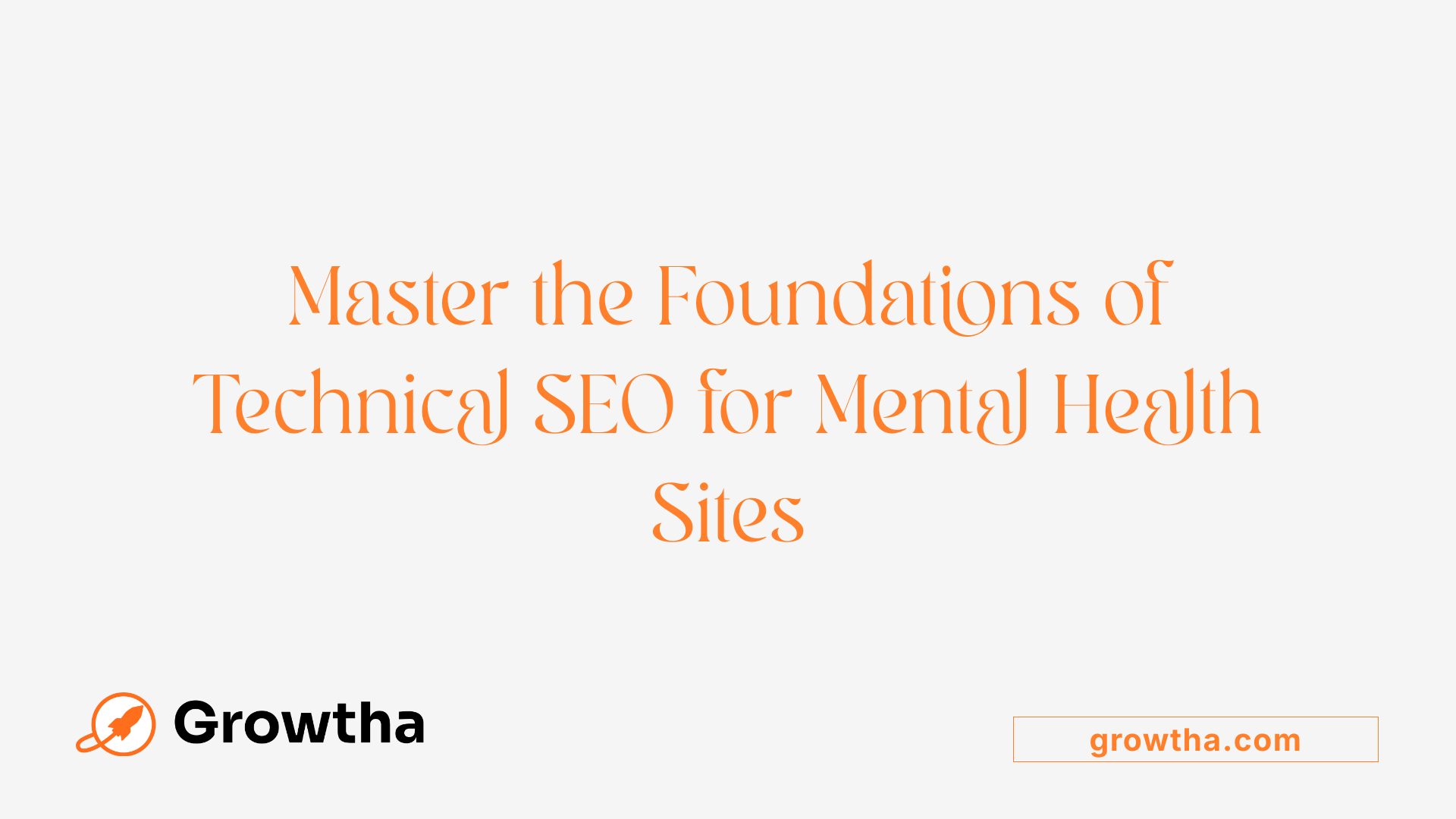SEO for Mental Health Professionals
Unlocking Online Visibility: SEO Strategies for Mental Health Professionals


SEO for Mental Health Professionals
Why SEO is a Game-Changer for Mental Health Practices
In today’s digital age, having a strong online presence is essential for mental health professionals seeking to attract new clients, build credibility, and grow their practices. Search Engine Optimization (SEO) plays a pivotal role in ensuring that your practice appears prominently in search engine results when potential clients are looking for mental health services. This comprehensive guide explores effective SEO strategies tailored specifically for mental health practitioners, covering everything from keyword research to technical SEO, and highlights how you can leverage SEO to expand your reach and establish a trusted online reputation.
Understanding SEO for Mental Health Professionals

What is SEO for mental health professionals?
SEO, or search engine optimization, for mental health professionals involves boosting your online presence so that your practice ranks higher in Google and other search engines. When people search for mental health services in your area, effective SEO helps your practice appear on the first page of results, making it easier for potential clients to find you.
This process includes various tactics such as keyword research to identify what clients are searching for, optimizing meta titles and descriptions, creating high-quality and relevant content like blogs or service pages, and applying local SEO strategies. Techniques like ensuring your website is easy to navigate on mobile devices, fast to load, and structured correctly are also essential.
A well-implemented SEO plan not only increases your visibility but also builds trust and credibility. Patients are more likely to choose a practice that appears reputable and accessible online.
Specialized agencies, like Sachs Marketing Group, bring over ten years of experience in tailoring SEO and digital marketing for therapists. Their goal is to ethically boost your practice’s online profile, attract more local clients, and establish a trustworthy reputation.
In summary, SEO for mental health practitioners is about making your practice easier to find by the right clients when they need mental health support, helping your practice grow sustainably over time.
The Importance of SEO for Mental Health Practices

Why is SEO important for mental health practices?
Search engine optimization (SEO) plays a vital role in elevating the online presence of mental health practices. Most people begin their search for therapy options on Google, making it essential for professionals to appear prominently in search results. By optimizing their websites—through targeted keywords, high-quality content, and strategic use of on-page elements—they can increase their visibility and attract more local clients.
Local SEO strategies, such as creating and maintaining a Google My Business profile, ensure practices appear in local searches and map results, which is crucial since many clients seek nearby therapists. Accurate contact details, location-specific keywords, and consistent NAP (Name, Address, Phone Number) information across listings bolster a practice’s local reputation.
Additionally, SEO helps in building trust and authority. Earning backlinks from reputable mental health organizations, directories, and related blogs signals credibility to Google, improving search rankings. Content that is genuinely useful—covering common client questions, treatment options, or mental health tips—encourages natural links and enhances relevance.
Implementing a comprehensive SEO strategy not only boosts visibility but also provides a higher return on investment compared to traditional advertising. It helps practices attract steady, quality inquiries, establish credibility, and achieve sustainable growth in a competitive environment. Overall, SEO is an indispensable tool for mental health professionals aiming to reach more individuals seeking support.
Core SEO Strategies Tailored for Mental Health Providers
What are effective SEO strategies for mental health professionals?
For therapists and mental health providers, implementing a thoughtful SEO approach significantly boosts online visibility and attracts more patients. It starts with detailed keyword research to identify relevant search terms such as "behavioral therapist," "cognitive behavioral therapy," or "child counselor" that potential clients are using. Incorporating local keywords, like city or neighborhood names, helps attract nearby clients, essential for local SEO.
Optimizing your website involves creating descriptive, trustworthy content that directly answers common patient questions. For example, writing detailed service pages, blogs about mental health topics, and bios of therapists with credentials and specialties enhances credibility. Google favors content that demonstrates expertise and trustworthiness, which can improve rankings.
Local SEO measures like claiming and optimizing a Google My Business profile are crucial. It’s important to maintain accurate NAP (Name, Address, Phone Number) details, encourage reviews, and include local keywords in content to appear in local search results and the coveted Google 3-pack.
Beyond content, technical SEO must not be overlooked. Ensure your website loads quickly (preferably within three seconds), is mobile-friendly, and has a clear, logical structure. These factors improve user experience, reduce bounce rates, and positively impact search rankings.
Building quality backlinks from reputable sources, such as mental health directories, lifestyle blogs, and community outreach, strengthens your website’s authority. Regularly monitoring SEO performance using tools like Google Search Console and analytics platforms helps maintain growth, identify opportunities, and refine your strategies.
In summary, effective SEO for mental health practices involves a combination of targeted keyword research, optimized on-page content, local SEO tactics, technical site improvements, and ethical backlink building. These elements together support sustained online presence and practice growth.
Local SEO and How It Can Boost Your Practice's Visibility
How can local SEO help mental health practitioners attract nearby clients?
Local SEO is an essential strategy for mental health professionals aiming to grow their practice within their community. By optimizing their online presence for local searches, practitioners increase their visibility to individuals seeking nearby mental health services.
One of the most effective tools for local SEO is Google My Business (GMB). By thoroughly optimizing their GMB profile—adding accurate contact information, clear images, service details, and responding to reviews—practitioners enhance their credibility and trustworthiness. An optimized profile makes it easier for potential clients to find and choose their practice, especially when they search for "therapist near me" or similar terms.
Incorporating local keywords naturally into website content also boosts regional relevance. This includes using city or neighborhood names in service pages, blog posts about local events or mental health resources, and FAQs tailored to community-specific concerns. Such localized content helps search engines associate the practice with area-specific queries.
Furthermore, building a network of positive reviews and reputable citations from local directories increases the practice’s authority. Encouraging satisfied clients to share their experiences improves social proof and trust, which are influential factors in decision-making.
Finally, acquiring local backlinks from community organizations, local news outlets, and health directories enhances the website’s authority in the eyes of search engines. This cascade of efforts collectively positions therapists as accessible, community-trusted resources, making it easier for local clients to find, trust, and select their services.
Technical SEO Essentials for Mental Health Websites

What are some recommended tools and platforms for building a website for mental health services?
When creating a website for mental health professionals, selecting the right platform is crucial. The ideal solution should be easy to use, secure, customizable, and tailored to the needs of therapy practices.
Popular options include WordPress, Wix, Squarespace, and SimplePractice Website Builder. These platforms offer numerous templates designed specifically for mental health providers, which are mobile-friendly and equipped with SEO features to help improve search rankings.
Brighter Vision stands out as a specialized platform that offers custom-designed websites for therapists. It includes lead capture tools, appointment scheduling, HIPAA-compliant hosting, and unlimited support. Its focus is on providing a professional online presence alongside security standards essential for mental health practices.
Another recommended resource is ChoosingTherapy.com, which provides detailed reviews and evaluation criteria emphasizing ease of use, reliability, security, and customer service.
The choice of platform ultimately depends on your specific practice needs, budget, and preference for support and customization. By selecting a reputable website builder, mental health professionals can establish a strong, compliant, and optimized online presence.
Site speed optimization
A fast-loading website is essential for both user experience and search engine rankings. Aim for a load time of three seconds or less by optimizing images, leveraging browser caching, and minimizing code.
Mobile-friendliness
With most users accessing websites via smartphones, ensuring your site is mobile-responsive is critical. Responsive design adapts layouts for different devices, making content accessible and easy to navigate.
Site architecture
A logical and simple site structure helps search engines crawl your website efficiently. Use clear menus, internal links, and a well-organized hierarchy to improve navigation and indexing.
URL structure
URLs should be short, descriptive, and include relevant keywords. For example, www.yoursite.com/anxiety-therapy helps both users and search engines understand the page content.
Indexing and crawling
Properly configuring your site's robots.txt file and XML sitemap helps search engines discover and index your content correctly. Regular audits ensure that all important pages are accessible and free of errors.
Optimizing these technical aspects forms the foundation for a successful SEO strategy, making sure your website is accessible, understandable, and ranking well on search engines.
Off-Page SEO Strategies and Link Building
 For mental health professionals aiming to enhance their online visibility, off-page SEO plays a vital role. An essential component of this strategy involves earning high-quality backlinks from reputable, relevant sites. The quality and relevance of backlinks are crucial since search engines consider links from trustworthy sources as endorsements, which boost a website’s authority and search rankings.
For mental health professionals aiming to enhance their online visibility, off-page SEO plays a vital role. An essential component of this strategy involves earning high-quality backlinks from reputable, relevant sites. The quality and relevance of backlinks are crucial since search engines consider links from trustworthy sources as endorsements, which boost a website’s authority and search rankings.
One effective method to build such links is through guest blogging. By contributing informative articles on well-known mental health or health-related platforms, therapists can gain exposure and earn backlinks that reflect their expertise and credibility.
Additionally, social media marketing helps increase a practice’s reach and can indirectly influence link building. Sharing valuable content on platforms like Facebook, Instagram, or Twitter encourages sharing and engagement, potentially leading to backlinks from interested parties or media outlets.
Forming strategic partnerships and listings on industry-specific directories further enhances off-page SEO. Collaborating with mental health organizations, local community portals, or niche directories improves a practice’s local search presence and provides valuable backlinks.
How can mental health professionals measure the success of their SEO efforts?
Mental health professionals can evaluate their SEO success by tracking organic website traffic, search engine rankings for specific keywords, and new patient inquiries resulting from online visibility. Utilizing tools like Google Analytics and Google Search Console facilitates monitoring metrics such as bounce rate, user engagement, and conversions.
Regular keyword ranking assessments with platforms like SEMrush or Ahrefs reveal progress in search visibility. Analyzing backlink profiles and local SEO achievements, including Google My Business performance and review counts, offers additional insights.
Consistently reviewing these data points enables practitioners to refine their off-page SEO strategies, ensuring sustained growth and improved patient acquisition. Ultimately, a well-executed off-page SEO plan builds a strong online reputation, attracts more local clients, and establishes long-term authority in the mental health field.
Content Marketing and Authority Building in Mental Health SEO
Creating valuable content is essential for effective mental health SEO. This involves developing material that directly responds to client questions and addresses their needs. Blog posts, videos, e-books, and guest articles that offer practical advice and insights help therapists establish authority and trust.
For example, writing articles that explain common mental health conditions like anxiety or depression, or providing self-help tips and guides to therapy processes, can attract individuals searching for relevant information online. Such content not only helps answer potential clients’ questions but also demonstrates expertise.
Empathy-based content marketing campaigns, which focus on addressing clients’ concerns genuinely, can significantly boost engagement. These strategies encourage sharing and backlinks organically, enhancing the website’s authority and visibility in search results.
Using various content formats caters to different learning styles and preferences, signaling activity and relevance to search engines. Video content, infographics, and detailed articles can improve user experience and increase the chances of appearing higher in search rankings. Consistently producing high-quality, targeted content helps mental health professionals attract and convert more online visitors into clients.
Measuring and Tracking SEO Success with Tools and Metrics
How can mental health professionals measure the success of their SEO efforts?
Evaluating the effectiveness of SEO strategies is essential for mental health professionals aiming to attract more clients online. The primary indicators include increases in organic website traffic, improved search engine rankings for relevant keywords, and an uptick in new patient inquiries originating from search results.
Google Analytics is a vital tool that provides detailed insights into website visitor behavior. Practitioners can monitor metrics such as bounce rates, which show how well their content retains visitors, and user engagement signals like session duration and page views. This data reveals whether website visitors find the content useful and stay longer.
Google Search Console complements this by offering search-specific insights. It helps track keyword performance, monitor click-through rates, impressions, and identify indexing issues that might hinder visibility. Regularly checking keyword rankings with SEO tools like SEMrush, Ahrefs, or Moz enables therapists to see if their targeted terms are moving higher on search results pages.
Backlink analysis is another important aspect, as high-quality links from reputable sites increase a practice’s domain authority. Tools such as Moz’s Link Explorer or Ahrefs allow providers to understand their backlink profile and identify opportunities for growth.
Local SEO metrics, including Google My Business insights, review quantities and ratings, and local search queries, reflect a practice’s visibility within the community. An increase in local searches and positive reviews often correlates with higher patient engagement.
By regularly analyzing these metrics, mental health professionals can determine what strategies are working, identify gaps, and make data-driven adjustments. Consistent monitoring ensures their online presence remains strong, relevant, and capable of driving meaningful growth.
Partnering with Digital Marketing Experts for Tailored Strategies
Collaborating with specialized agencies can significantly enhance your online presence as a mental health professional. These agencies focus specifically on marketing strategies tailored to therapy practices, leveraging data-driven planning to identify the most effective keywords, target audiences, and content types.
A good digital marketing partner will offer comprehensive services, including content creation—such as blog posts, videos, and downloadable resources—that resonate with your clients' needs. They can also help in developing and maintaining a professional, user-friendly website that is optimized for both search engines and patient engagement.
Website development is a critical aspect, involving technical SEO, responsive design, and easy navigation to improve user experience and search rankings. Agencies often provide SEO consulting to fine-tune on-page elements like title tags, meta descriptions, headers, and structured data, ensuring your site meets the latest best practices.
Recommended Tools and Platforms for Building a Website for Mental Health Services
Choosing the right platform to host and build your website is fundamental. Popular options include WordPress, Wix, and Squarespace, all offering customizable templates suitable for therapy practices. SimplePractice Website Builder and Brighter Vision are specialized platforms that deliver tailored functionalities such as scheduling tools, HIPAA-compliant hosting, and lead capture integrated directly into the site.
Brighter Vision, for example, provides custom-designed websites with ongoing support and marketing features that help therapists grow their online visibility. Platforms like ChoosingTherapy.com offer detailed evaluations of these tools, emphasizing ease of use, security, reliability, and customer support.
Why Partnering Can Accelerate Growth
Partnering with the right agency means gaining access to their expertise, resources, and industry insights. They help develop long-term strategies that focus on increasing qualified leads and establishing a credible online reputation. This support allows therapists to concentrate on providing quality care while their digital marketing efforts work in the background.
Whether you are just starting or seeking to refine your existing online presence, collaborating with experienced professionals can ensure your practice remains competitive and visible in local and broader online searches. This partnership ultimately drives more appointments and builds lasting trust with your clients.
Long-Term SEO Planning and Ethical Considerations
 Building authority through high-quality backlinks from reputable sites like mental health organizations and relevant blogs is fundamental for sustainable SEO success. This steady process improves a therapist's online reputation and search engine rankings.
Building authority through high-quality backlinks from reputable sites like mental health organizations and relevant blogs is fundamental for sustainable SEO success. This steady process improves a therapist's online reputation and search engine rankings.
Maintaining ethical practices is crucial in SEO for mental health professionals. Avoiding tactics like keyword stuffing or buying links ensures compliance with Google's guidelines and preserves trustworthiness. Ethical SEO focuses on creating genuine, helpful content and earning links naturally.
Developing a long-term strategy involves regular content updates, ongoing backlink acquisition, and consistent website optimization. Monitoring tools such as Google Analytics and Search Console help track progress and refine tactics.
By adhering to sustainable and ethical SEO methods, therapists can enjoy lasting visibility, attract qualified clients, and uphold their professional integrity over time.
Integrating SEO into Your Practice’s Growth Strategy
Implementing an effective SEO strategy requires careful planning, ongoing effort, and a focus on ethical, client-centered content. By conducting thorough keyword research, optimizing your website technically and content-wise, building reputable backlinks, and enhancing local search presence, mental health professionals can significantly improve their online visibility. Regularly reviewing performance metrics and adapting strategies based on analytics ensures sustained growth and reputation building. Partnering with experienced SEO professionals can streamline this process and help you achieve long-term success. Ultimately, a well-executed SEO plan not only attracts more clients but also establishes your practice as a trusted leader in mental health services — making your online presence a vital component of your professional growth.
References
- SEO for Therapists: The Ultimate Guide - Talkspace
- [PDF] SEO Guide for Psychologists
- SEO for Therapists + Psychiatrists That Attracts Patients
- SEO for Therapists: A Complete Guide | Avalanche Creative
- SEO for Mental Health Professionals: How to Get Found Online and ...
- SEO for Counselors, Therapists, and Psychologists
- SEO Non-Branded Visibility for Mental Health | Blue Interactive
- SEO for Therapists: How to Grow Your Practice Ethically and Get ...
- SEO for Therapists in 2025 and Beyond [Includes Keywords]







